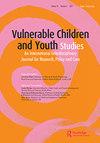新冠肺炎封锁期间饮食行为自我调节不良导致马来西亚年轻人体重增加
IF 0.9
Q4 FAMILY STUDIES
引用次数: 2
摘要
摘要本横断面研究旨在调查在新冠肺炎马来西亚全国封锁期间的身体活动、饮食行为的自我调节及其与体重轨迹的关系。采用国际体育活动问卷简表(IPAQ-SF)评估MCO期间的体育活动和久坐时间。饮食行为的自我调节通过饮食行为自我调节问卷(SREBQ)进行评估,而体重轨迹由受访者自我报告。据报道,在200名年轻人中,82.0%的人在MCO期间进行了体育活动,每周体育活动强度为4551.16±4744.89 MET分钟。本研究中的年轻人在MCO期间每天花费8.63±4.47小时进行久坐活动。还注意到,大多数人(71.0%)在封锁期间的饮食行为具有中等的自我调节能力,平均得分为3.08±0.49。自实施MCO以来,略多于一半的年轻人(57.0%)体重增加,平均体重增加1.28±0.60 kg。多项逻辑回归的结果表明,饮食行为的自我调节是MCO期间体重轨迹的重要预测因素。SREBQ得分较高的年轻人更有可能在持续体重(AOR=2.514,p=0.024,CI:1.129-5.597)和减肥(AOR=2.624,p=0.011,CI:1.250-5.507)类别中得分。总之,在马来西亚的MCO期间,对食物线索的不良反应(饮食行为的自我调节不良),而不是身体不活动,导致了体重增加。本文章由计算机程序翻译,如有差异,请以英文原文为准。
Poor self-regulation in eating behaviour during the COVID-19 lockdown contributes to weight gain among young adults in Malaysia
ABSTRACT This cross-sectional study aims to investigate physical activity, self-regulation in eating behaviour, and their associations with body weight trajectory during the COVID-19 nationwide lockdown (Movement Control Order, MCO) in Malaysia. The International Physical Activity Questionnaire-Short Form (IPAQ-SF) was used to assess physical activity and sitting time during the MCO. Self-regulation in eating behaviour was evaluated with the Self-Regulation of Eating Behaviour Questionnaire (SREBQ), while weight trajectory was self-reported by the respondents. Of the 200 young adults, 82.0% were reported to be physically active during the MCO, with a weekly physical activity intensity of 4551.16 ± 4744.89 MET-minute. Young adults in this study spent 8.63 ± 4.47 hours/day on sedentary activities during the MCO. It is also noted that the majority (71.0%) had medium self-regulation in eating behaviour during the lockdown, with a mean score of 3.08 ± 0.49. Slightly more than half of the young adults (57.0%) gained weight since the MCO enforcement, with an average weight increment of 1.28 ± 0.60 kg. Findings from the multinomial logistic regression suggested that self-regulation in eating behaviour was a significant predictor for weight trajectory during the MCO. Young adults who attained a higher score in SREBQ were more likely in sustained weight (AOR = 2.514, p = 0.024, CI: 1.129–5.597) and weight loss (AOR = 2.624, p = 0.011, CI: 1.250–5.507) categories. In conclusion, poor response to food cues (poor self-regulation in eating behaviour), but not physical inactivity, led to weight gain during the MCO in Malaysia.
求助全文
通过发布文献求助,成功后即可免费获取论文全文。
去求助
来源期刊

Vulnerable Children and Youth Studies
FAMILY STUDIES-
CiteScore
1.90
自引率
0.00%
发文量
33
期刊介绍:
Vulnerable Children and Youth Studies is an essential peer-reviewed journal analyzing psychological, sociological, health, gender, cultural, economic, and educational aspects of children and adolescents in developed and developing countries. This international publication forum provides a much-needed interdisciplinary focus on vulnerable children and youth at risk, specifically in relation to health and welfare issues, such as mental health, illness (including HIV/AIDS), disability, abuse, neglect, institutionalization, poverty, orphanhood, exploitation, war, famine, and disaster.
 求助内容:
求助内容: 应助结果提醒方式:
应助结果提醒方式:


